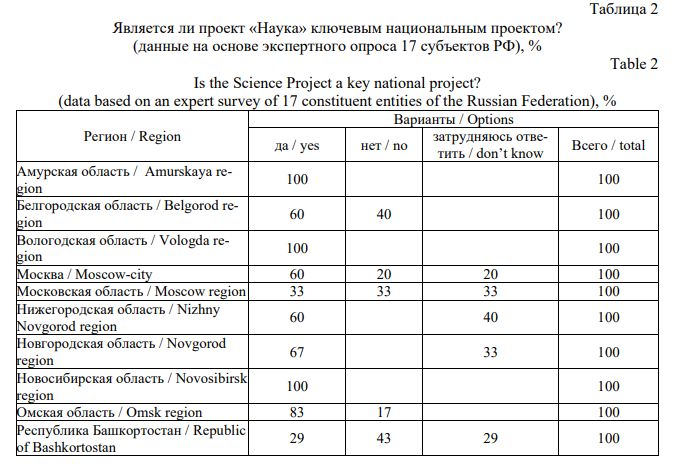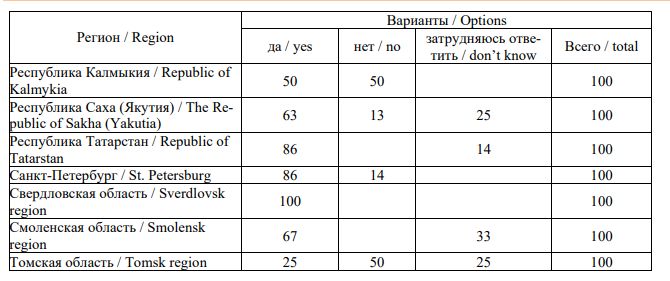What prevents the “breakthrough” Russian project “Science” from becoming a real breakthrough?
This work continues the study of the problems of regional readiness for innovative activities, taking into account their involvement in various levels of socio-cultural modernization. The study is being carried out by the Center for Sociology of Management and Social Technologies of the Federal Scientific Research Center of the Russian Academy of Sciences. But if the goal of the first stage was to obtain preliminary data on the barriers that impede the implementation of the goals and objectives of the system of scientific and technical development (SSTD) associated with information and communication feedback channels and with mechanisms for monitoring the implementation of strategic programs in the regions using the method of remote site analysis regional authorities, then at this stage we received data from specially selected groups of experts not only on the situation in the regions, but also on the comparison of primary information on individual programs with the implementation of the Science Program. As a result, we came to the conclusion that sociological support for the preparation and implementation of strategic documents, using the example of the implementation of the RF SNTD, does not give a complete picture of the organization of work in the regions to solve the socio-economic problems of their development. The content analysis of websites of regional authorities and materials of expertise in the regions enabled to get a better understanding of intentions of the management systems and their interests mainly aimed at: business or reporting, obtaining more complete data on the content and structure of social conditions in the regions, directly affecting the implementation of strategically important decisions for the country on the basis of such documents as the Concept, Strategy and the Program of Innovative Development. However, with regard to the Science Project, an ambiguous situation has developed: on the one hand, experts put this national project as one of the key ones (80%), and on the other hand, they note that the population is unlikely to strongly support it (34%) and it is not known how the administration of regions that are at different stages of socio-cultural modernization will cope with this task. To understand the problem situation more clearly, a list of specific factors (conditions) was formulated and studied that contribute to the transformation of the national Science Project into a driver for the implementation of other national projects, such as administrative, financial, economic, political and social, and proposals were made for organizational and managerial character. This made it possible to draw conclusions about the creation of special organizational structures in the regions for a fuller use of the potential of the national Science Project.
Figures



Tikhonov, A. V. and Merzlykov, A. A. (2020), “What prevents the “breakthrough” science project from becoming a real breakthrough?”, Research Result. Sociology and management, 6 (4), 112-127, DOI: 10.18413/2408-9338-2020-6-4-0-7.


















While nobody left any comments to this publication.
You can be first.
Aksenova, O. V. (2016), Social action Paradigm: professionals in Russian modernization, ISRAS, Moscow, Russia. (In Russian)
Lapin, N. I. (ed.) (2016), Atlas of Russia and its regionsmodernization: socio-economic and socio-cultural trends and problems, VesMir, Moscow, Russia. (In Russian)
Akhiezer, A. S. (2008), Russia: historical experience criticism, Novy hronograf, Moscow, Russia. (In Russian)
Bogdanov, V. S., Guseynova, K. E., Merzlykov, A. A. and Tikhonov, A. V. (2016), “Organizational and methodological aspects of remote monitoring of implementation of cluster policy in regional and sectoral aspects (on materials of the remote sensing studies)”, Research result. Sociology and Management, 2 (1), 41-56. (In Russian).
Giddens, E. (2011), The Consequences of modernity, Paradokys, Moscow, Russia (In Russian).
Gorshkov, M. K. and Trofimova, I. N. (2016), “Education as a Factor and Resource of Civic Participation and Democratic Development of Society”, Sociological Science and Social Practice, (1), 5-19. (In Russian)
SUIN № 1 (2012), The competitiveness of domestic IT companies (based on interactive study), Institute of Sociology, Russian Academy of Sciences, Moscow, [Online], available at: http://www.isras.ru/ inab_2012_01 (Accessed 04 October 2020.).
The cluster policy in RF: regional and branch aspects (on the materials of an interactive research in 2012-2014) (2015), Project manager and Executive Editor Tikhonov, A. V., The Institute of Sociology of the Russian Academy of Sciences, Moscow, 1CD ROM. (In Russian).
Lapin, N. I. (2017), “The spontaneous nature of the regional modernization processes and innovation systems development (on the basis of the “Atlas of Russia and its regions modernization”)’, in Russia and the world: global challenges and strategies of sociocultural modernization, FNISCH RAN, Moscow, 73-77. (In Russian)
He Chuangui (ed.) (2011), Overview report on modernization in the world and China (2001-2010), Ves Mir, Moscow, Russia. (In Russian).
Russia: the power-management vertical reforming in the context of socio-cultural modernization of regions [monograph] (2017), in Tikhonov, A.V. (ed.), FNISCH RAN, Moscow, Russia. (In Russian)
Tikhonov, A. V., Bogdanov, V. S., Merzlyakov, A. A. and Guseinova, K. E. (2018), “Development and Implementation Problems of Scientific and Technological Progress Strategic Programs in the Russian Federation Regions: Social and Organizational Barriers”, MIR (Modernization. Innovation. Research), 9 (3), 380-415. (In Russian)
Tikhonov, A. V., Bogdanov, V. S. and Merzlyakov, A. A. (2014), “Experience of remote analysis of the implementation of cluster policy in regional and sectoral aspects”, MIR (Modernization. Innovation. Research), (4), 52-65. (In Russian)
Tikhonov, A. V., Bogdanov, V. S. and Pochestnev, A. A. (2017), “Expert Evaluation of Potential Points of Economic Growth in the Regions of Russia and the Conditions of their Development”, MIR (Modernization. Innovation. Research), 8(2(30)), 286-296. (In Russian)
Tikhonov, A. V., Bogdanov, V. S. and Merzlyakov, A. A. (2015), “Realization of Cluster Politics in the Russian Federation Regions (Workshop on the Research Results)”, Bulletin of the Institute of Sociology, (14), 140-157. (In Russian)
Tikhonova, N. E. (2007), Social stratification in modern Russia: experience of empirical analysis, ISRAS, Moscow, Russia. (In Russian)
Blei, D. M. and Lafferty, J. D. (2006), “Dynamic topic models”, ICML '06 Proceedings of the 23rd international conference on Machine learning, June 25 –29, Pittsburgh, Pennsylvania, USA, 113-120.
Coleman, J. S. (1990), Foundations of Social Theory, Belknap Press of Harvard University Press, Cambridge, UK.
Perroux, F. (1950), “Economic Space: Theory and Applications”, Quarterly Journal of Economics, (1), 34-64.